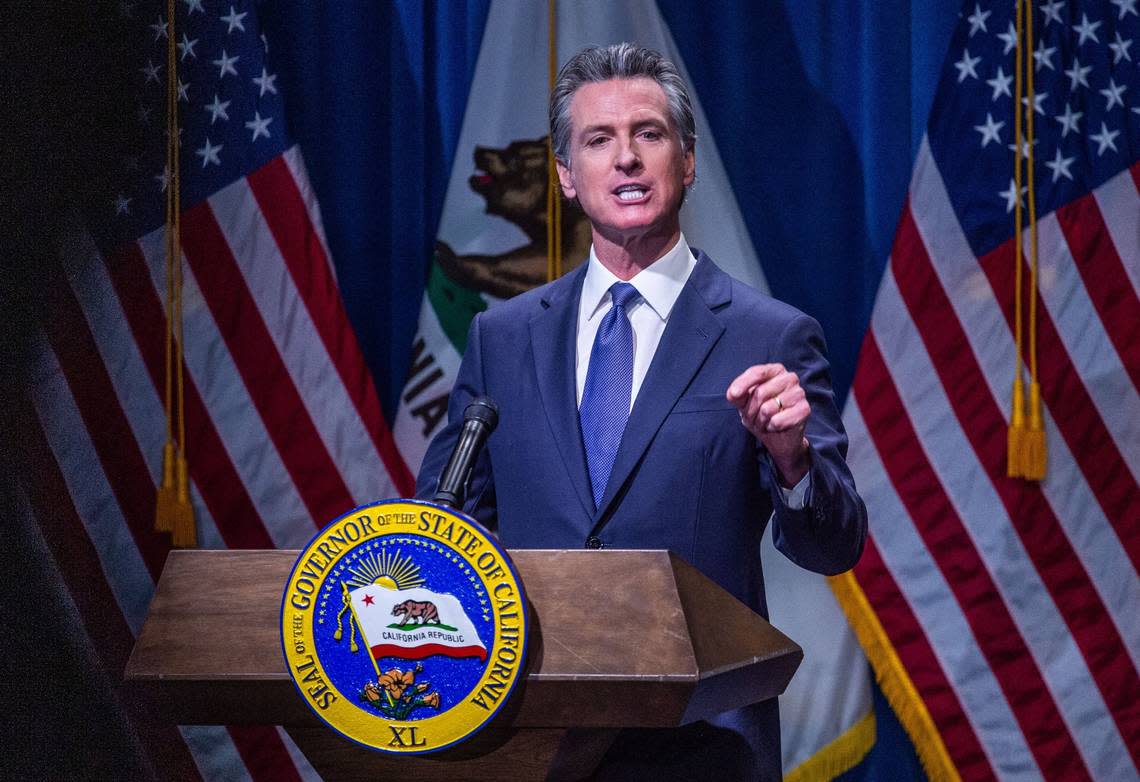Gavin Newsom signals support for bills to crack down on deepfake election content

- Oops!Something went wrong.Please try again later.
Gov. Gavin Newsom said he would sign legislation to crack down on the use of campaign advertisements altered or generated by artificial intelligence in another episode of a running feud between the governor and entrepreneur Elon Musk.
Newsom posted a screenshot of a news headline where Musk shared a video mimicking a campaign ad for Vice President Kamala Harris, which appears to use an AI-generated voiceover from her.
“Manipulating a voice in an ‘ad’ like this one should be illegal,” Newsom wrote. “I’ll be signing a bill in a matter of weeks to make sure it is.”
Manipulating a voice in an “ad” like this one should be illegal.
I’ll be signing a bill in a matter of weeks to make sure it is. pic.twitter.com/NuqOETkwTI— Gavin Newsom (@GavinNewsom) July 29, 2024
Musk responded to Newsom’s post with a vulgarity and said “parody is legal in America.”
The social media scuffle came less than two weeks after Musk announced he would be moving headquarters of several business ventures including social media platform X and SpaceX out of California.
Newsom’s spokesperson Izzy Gardon did not specify which bill the governor was referring to, saying only that “we’re working with the Legislature to ensure this issue is addressed in legislation already going through the legislative process.”
There are several bills currently in play that aim to address the altered campaign materials that crop up on social media.
A bill by Asm. Marc Berman, D-Menlo Park, titled the “Defending Democracy from Deepfake Deception Act of 2024” would require platforms to block deceptive election-related content 120 days before an election and 60 days following.
Outside of that time frame, it would require social media and other platforms to label content as having been manipulated and allow California residents to report content as fake or misleading.
State law already prohibits distributing “materially deceptive audio or visual media of a candidate” within 60 days of an election.
Another bill, AB 2839 by Asm. Gail Pellerin, D-Santa Cruz, would expand that time frame to 120 days.
Pellerin’s office said she had not had any discussions with the governor’s office about the bill.
“The rapid advancement of artificial intelligence has made it alarmingly easy for anyone with a computer to create convincing, yet fake, audio and video content,” Pellerin said in a statement. “The deceptive use of altered media poses a serious threat to our democracy by undermining voters’ faith in elections.
Pellerin, who spent 27 years as Santa Cruz County’s chief elections official, said the fabricated video circulated by Musk “is a concrete illustration of how powerful this technology has become, and underscores the need to protect against the malicious use of artificially generated media to manipulate elections.”
Members of the legislature have been in recess since early July. They return Monday for the final stretch of the legislative session, which ends Aug. 31.

